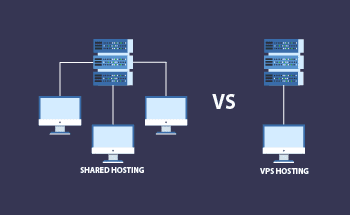WHAT ARE VPS AND VDS?
10:58, 14.04.2021
If you are looking to host your website on the web and thinking of what hosting type to select, you should pay attention to VPS-server (or VDS-server). Many experts believe that this is optimal technology and has all the needed features, such as stability, setup properties, and cost. We will tell you what kind of service is provided, how it works, and which pros and cons it has. It will allow you to make a considered decision.
General data about VPS hosting
VPS stands for a virtual private server. Also, another definition is used: a virtual dedicated server. However, let us make things clear: VDS is the same as VPS; it neither uses different hardware nor provides a different service. All the difference is in the term. In some companies, the first name is more popular, while in others, the other name is used.
VPS or VDS hosting is the next level after usual web-hosting. The environment is located in a data center on a physical machine; other websites are also located there. On the other hand, all the websites are isolated and work independently. The number of VPS servers is determined by the hardware power and the company policy. The dedicated resources are determined by selected plans and packages.
VPS Operation Principle
The main feature of such hosting is virtualization. It allows dividing a physical server into separate virtual servers. The hardware resources, whether it is a channel, memory, SSD/HDD, or processor power, are distributed between the websites supported by the environment. Even if one VDS server requires special resources, the power of your VDS server will be not lower than the value indicated in the agreement with your hosting provider.
There are many virtualization technologies applied to VPS hosting. The following are the most popular ones:
- Container virtualization. It got its name because on the server a container or a section is created for every website. Other resources are distributed by a special program called a hypervisor. The OS is general for all websites; it cannot be changed (that's why there is a term “OS-level virtualization”). The benefits are productivity, ease of setup, and an increase of the VDS-server power without overloads. However, it is impossible to choose the OS (thus, not all the website technologies are possible to implement), the isolation from other websites is weak (in the case of a core error or its access by somebody will have an impact on all the virtual dedicated servers), and the guarantee of virtual dedicated resources is absent. Thus, issues might occur with some processes such as mailing or the launch of Java apps. Usually, those are Linux-core servers realized with OpenVZ technology.
- Full virtualization. It is also called hardware virtualization. Every VPS server has not only its dedicated location on a hard disk but also has a dedicated volume of memory and its own core. It offers wider opportunities to website owners. For example, you can set up any OS or modules (VPN, for example). You can launch complex services (Streaming). You always have the resources you agreed on (except for the real server processor). Consider also such factors as security and stability - each section is isolated from the others. However, there are drawbacks, too. You cannot increase the operational resource without the change of tariff plan and server restart. This virtualization type is made based on KVM technology; it is not as productive as containered virtualization (though the difference is almost unnoticeable).
Benefits and Drawbacks of VPS server
VPS offers many benefits and drawbacks, but they are relative compared to other hosting types. Thus, it is better to classify them based on competitors.
VDS hosting benefits compared to web-hosting
- It is isolated. Your server doesn`t depend on neighbours. Even if they face some issues, you aren’t influenced. VPS operation depends only on hardware and the data center functioning.
- Functionality. With VPS, you are guaranteed a specific power. You can upload any databases, execution files, FTP or mail clients, and similar to your server. You are limited by the tariff only.
- Different types of programs. When you use VPS, you decide what programs you set up, including plugins. You aren’t limited to specific programming languages, either; you can use C++, Python, Node.js, Ruby, etc. (for web hosting, only PHP can be used).
- Complete control. You have full access to all the settings of the server, system files, firewall, and similar, including root access and admin access. You can launch a website, use the server as a VPS mail service, and similar.
- Security. VDS means stability. The attempts to break through the server security or a DDOS attack will not influence the operation of other servers. You also don't have to pay for an IP address, and if one resource is blocked, other resources are available.
VPS benefits compared to a dedicated server
- Scalability. If you lack resources, you can increase their volume. To do so, it is sufficient to get in touch with the hosting provider, and in some situations, you might even not need to restart the server.
- Cost. A separate physical server requires more money than the most powerful VPS hosting. For serious tasks, it might be justified, but in most cases, you can save money.
Regarding the drawbacks that you shall consider, they are as follows.
VDS drawbacks compared to web-hosting
- The complexity of management. Virtual dedicated servers require maintenance and setting them up. Thus, you need a specialist or good customer support from the side of the service provider.
- Prices. VPS is more expensive than traditional web-hosting. Even though you can also find hosting companies offering nice prices, such as HostZealot (more details you can read here).
VPS hosting drawbacks compared to a physical server
- Limitations. It doesn't matter what possibilities and settings a VPS offers; if you have a separate machine, you are 100% free. It is a perfect solution for big projects.
When It Is Worth Switching to VPS
To sum up, there are some simple tips to see when you need to move a virtual dedicated server instead of web-hosting. If you have a website and it is live, you will need to upgrade it. Here is a list of situations when you might need to switch to VPS:
- Specific needs. VDS server allows performing non-standard website setups. It can be a PHP version, additional modes, and similar. Such tasks can be not only in big companies but also can be needed for usual people running a WordPress blog on CMS (if you decide to set up your WordPress on a virtual dedicated server, you are recommended to read our special guide)
- Insufficient power. When the website is live, an increasing number of customers visit it. It causes loads to the servers. When you use the usual web-hosting, you have a fixed and rather small resources volume. With VPS hosting, such issues don't exist even if you work with a usual VPS WordPress website.
- Security issues. If you use web hosting, and the neighbours are attacked, it can cause problems for your website, too. It leads to a decrease in visitors number. In such situations, you can only hope that the hosting provider intrudes (though even the best ones cannot manage everything). If you use VPS, you don't care about the problems of others.
Conclusion
By using a good VPS server, you get a lot of benefits. HostZealot offers:
- KVM technology based VDS-hosting, Linux and Windows OS
- A possibility to set up any mode, apps, etc.
- Guaranteed resources indicated in the agreement.
- VPS in 11 locations on several continents, from Hong Kong to the USA.
- Diversity of tariffs for different purposes.
- Advanced control panel with a dedicated server.
- Professional customer support.
With HostZealot, you can be sure that your VPS is the best solution for the launch and servicing of your website or any other web project!


